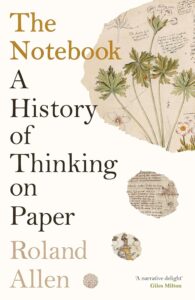
The Notebook: A History of Thinking on Paper
by Roland Allen
Genres: History, Non-fictionPages: 416
Rating:

Synopsis:We see notebooks everywhere we go. But where did this simple invention come from? How did they revolutionise our lives, and why are they such powerful tools for creativity? And how can using a notebook help you change the way you think?
In this wide-ranging story, Roland Allen reveals all the answers. Ranging from the bustling markets of medieval Florence to the quiet studies of our greatest thinkers, he follows a trail of dazzling ideas, revealing how the notebook became our most dependable and versatile tool for creative thinking. He tells the notebook stories of artists like Leonardo and Frida Kahlo, scientists from Isaac Newton to Marie Curie, and writers from Chaucer to Henry James. We watch Darwin developing his theory of evolution in tiny pocketbooks, see Agatha Christie plotting a hundred murders in scrappy exercise books, and learn how Bruce Chatwin unwittingly inspired the creation of the Moleskine.
On the way we meet a host of cooks, kings, sailors, fishermen, musicians, engineers, politicians, adventurers and mathematicians, who all used their notebooks as a space for thinking and to shape the modern world.
In an age of AI and digital overload, the humble notebook is more relevant than ever. Allen shows how bullet points can combat ADHD, journals can ease PTSD, and patient diaries soften the trauma of reawakening from coma. The everyday act of moving a pen across paper can have profound consequences, changing the way we think and feel: making us more creative, more productive - and happier.
Roland Allen’s The Notebook is, as the subtitle says, “A History of Thinking on Paper” — one that ranges pretty far tracking down where we began to use paper as a way to do things we can’t hold in our heads, as a tool for processing information, as a way to test things out, etc. It’s almost completely Western-oriented, focusing on areas like Italy, France and the UK for the most part, discussing various different strands of how notebooks are used. First for financial accounting, then for digesting popular culture and literature, and then evolving into diaries. It also discusses artists’ sketchbooks, the use of notebooks for collecting recipes, and of course, bullet journaling.
It’s the kind of book I love, rambling through the topic and finding examples to discuss, casting them in their context, etc. I found the stuff about da Vinci’s notebooks particularly fascinating, for example (and giggled about the cursing of his terrible handwriting), and of course, Darwin’s notebooks and the famous “I think”.
My favourite chapter of all was the one about ICU patient diaries and how they’re used, though. I didn’t expect this book to make me cry, but the topic hit unexpectedly close to home here, and I found myself crying my way through the last few pages of that chapter.
Definitely recommended if you’re interested in this kind of thing — not just notebooks specifically, but also if you enjoy history through the eye of a single object or set of objects.
Rating: 5/5
